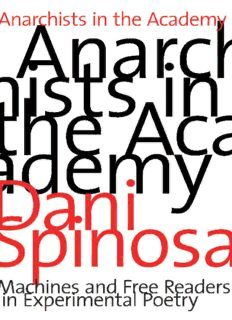
Anarchists in the Academy. Machines and Free Readers in Experimental Poetry PDF
Preview Anarchists in the Academy. Machines and Free Readers in Experimental Poetry
Anarchists in the Academy Anarchists in the Academy Anarchists in the Academy Anarchists in the Academy Anarchists in the Academy Anarchists in the Academy Dani Spinosa Dani Spinosa Machines and Free Readers in Experimental Poetry 1 The University of Alberta Press Published by All rights reserved. No part of this publication may be reproduced, stored in a retrieval The University of Alberta Press system, or transmitted in any form or by any Ring House 2 means (electronic, mechanical, photocopying, Edmonton, Alberta, Canada t6g 2e1 recording, or otherwise) without prior written www.uap.ualberta.ca consent. Contact the University of Alberta Press for further details. Copyright © 2018 Dani Spinosa The University of Alberta Press supports copyright. Copyright fuels creativity, encourages diverse voices, promotes free library and archives canada speech, and creates a vibrant culture. Thank cataloguing in publication you for buying an authorized edition of this book and for complying with the copyright Spinosa, Dani, 1986–, author laws by not reproducing, scanning, or Anarchists in the academy : machines and distributing any part of it in any form without free readers in experimental poetry permission. You are supporting writers and / Dani Spinosa. allowing the University of Alberta Press to continue to publish books for every reader. Includes bibliographical references and index. Issued in print and electronic formats. The University of Alberta Press gratefully isbn 978–1–77212–376–0 (softcover).— acknowledges the support received for its isbn 978–1–77212–405–7 (pdf) publishing program from the Government of Canada, the Canada Council for the Arts, and 1. Experimental poetry—21st century— the Government of Alberta through the Alberta History and criticism. 2. Anarchism in Media Fund. literature. 3. Semiotics and literature. 6 7 4. Poetics. 5. Criticism. I. Title. pn1059.e94s65 2018 809.1’911 c2018–900806–7 First edition, first printing, 2018. First electronic edition, 2018. Copyediting by Lesley Peterson. Proofreading by Kirsten Craven. Indexing by Siusan Moffat. Book design by Alan Brownoff. For my mother, who made our house a taz, complete with communal garden, basement grocery co-op, renegade theatre company, independent fashion and costume design, a radical sense of wonder, and the knowledge that no matter how different we all became, we could get ice cream together. Contents Acknowledgements ix Introduction xi Postanarchism, Experimental Poetry, and the Academy 1 Precursors to Digital Writing 1 Jackson Mac Low Is Something Something 3 John Cage Making Excessive Noise 14 Robert Duncan Plagiarizing 25 bpNichol for the Curious Viewer/Reader 35 2 Feminism, Print, Machines 51 Susan Howe Sleeping in the Library 54 Erín Moure’s Name in Quotation Marks 71 [Juliana Spahr Prefers Both 84 Harryette Mullen Making Kimchee in a Museum 95 3 Easy Concepts 107 Kenneth Goldsmith Talking to Himself 111 Vanessa Place Without Serifs 124 Christian Bök Obsolesces the Avant-Garde 134 Darren Wershler andor Any Number of Readers 142 4 Digital Interventions 153 Jim Andrews Drifts Apart 156 W. Mark Sutherland Puts the Cedar in Abecedarian 166 Brian Kim Stefans Alphabetizes Dreams 177 Andy Campbell, Mez Breeze, and the Constrict(l)ure of Code 186 Conclusion 199 Notes 205 Works Cited 215 Permissions 233 Index 235 Acknowledgements this book exists because Andy Weaver played “Ursonate” one day in his Introduction to Poetry lecture, and then let me bother him for another decade. Without his guidance, advice, reading lists, and alcohol- fuelled rants, I could never have written this—first as a dissertation, and then again as a book. Thank you to his wife Kelly and his beautiful babies, Duncan and Hugh, for letting me occupy so much of his time and atten- tion. I also want to thank Stephen Cain, Art Redding, Richard Telekey, David Goldstein, and Craig Dworkin for reading this work in its first iteration and guiding it so generously and thoughtfully to its current state. I also thank Juliana Spahr, W. Mark Sutherland, and Jesse Cohn for responding to personal correspondences and talking words and anarchy with me. I also owe a huge thank-you to my partner, Jesse, for reading through this work in its many forms and for tiptoeing through my office when he knew I was in writing mode. Thank you to early readers of the blog, Kate Siklosi, Matt Carrington, Caitlin O’Kelly, and Sean Braune, and to the generous and fabulous members of my writing workshop, Melissa Dalgliesh, Samantha Bernstein, Jonathan Vandor, and Thom Bryce. Thank you to the team at the Electronic Literature Organization and the Electronic Literature Directory, especially Dene Grigar, Davin Heckman, and Joseph Tabbi, for bringing me into the wonderful world of electronic ix
Description: